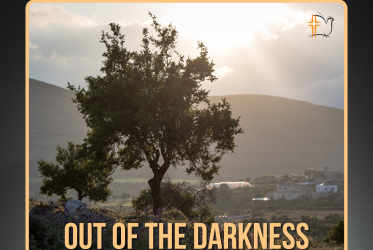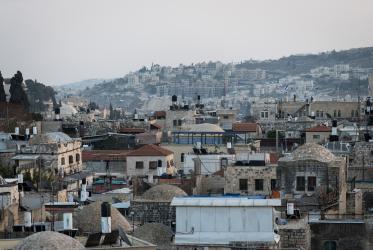Your Eminence, Excellencies,
Ladies and Gentlemen,
dear Brothers and Sisters in Christ,
“’Peace, peace’, they say, when there is no peace”. Jeremiah 6:14; 8:11
The World Council of Churches looks to the Middle East region as the place of the historical origins of our faith where Jesus Christ was born, crucified and resurrected. The worldwide ecumenical fellowship has always sought to be in active solidarity with the Christians of the Middle East, who are living in continuation of an unbroken line of faithful Christian witness in the multi-religious contexts of their countries, making vital contributions to the vibrant diversity and development of their societies.
Upheavals, violent extremism using religion as justification, ongoing military occupations, discrimination and systematic violations of human rights, economic crises and corruption, absence of the rule of law, and other factors have contributed to an existential crisis for all in the region. This is particularly affecting vulnerable communities, including Christians who are facing displacement and mass migration.
In the 11th Assembly of the WCC in Karlsruhe, Germany, we recognized the threat to the future of the indigenous Christians and of all the people of the Middle East. We affirm that the best means of averting this threat is equal rights, inclusive citizenship, justice and dignity for all, without religious or racial discrimination. We commit to the guiding principles of “God’s justice and love for all of creation, the fundamental rights of all people, respect for human dignity, solidarity with the needy and dialogue with people of other faith” (CC Feb 2011) that remain the foundation of our ecumenical response to the region. Sadly, the reality on the ground in different countries of the Middle East challenges this vision.
The situation in Israel/Palestine cannot be resolved by violence but only by peaceful means in accordance with international law. We affirm the rightful place of the State of Israel in the community of nations and recognize its legitimate security needs. At the same time we affirm the right of the Palestinians for self-determination and that the Israeli occupation of the Palestinian territories since 1967, as well as settlement construction and expansion in the occupied territories, is illegal under international law and must be ended. We believe that it is only through an end to the occupation and a just, comprehensive and lasting peace settlement that the security of both Palestinians and Israelis can be assured.
20 years with the Ecumenical Accompaniment Programme in Palestine and Israel (EAPPI)
In 2002 the World Council of Churches (WCC) founded the Ecumenical Accompaniment Programme in Palestine and Israel (EAPPI) in response to a call by church leaders in the Holy Land. When violence swept through Israel and the occupied Palestinian territory following the outbreak of the Second (Al Aqsa) Intifada in 2000, Heads of Churches in Jerusalem appealed to the world for support in their efforts for a just peace and reconciliation.
The WCC, whose member churches represent about 580 million Christians worldwide, answered the call. In a meeting with the WCCs Executive Committee, local Christians proposed “an accompaniment programme (including) an international ecumenical presence…closely linked to the local churches.”
Earlier in 2002, residents of the small village of Yanoun were driven out of their homes by high levels of settler violence. Israeli and international peace activists took action and decided to live in the village of Yanoun, hoping that the village residents would find it safe to come back. Due to the protective presence provided by these activists, the residents of Yanoun were able to return.
This success served as inspiration and in 2002 the Ecumenical Accompaniment Programme in Palestine and Israel (EAPPI) was born. WCC member churches have since recruited over 1,800 Ecumenical Accompaniers (EAs) from 25 countries to serve 3-month terms in placements around the West Bank. Working closely with local communities, Israeli and Palestinian human rights groups, and international agencies, EAPPI has maintained a constant presence in the region ever since and will remain until just peace are prevailed in the Holy Land.
Words of gratitude
I would like to expressing my gratitude to all of you involved in the EAPPI programme, to the Heads of Churches, to the member churches, specialized ministries and ecumenical partners for your ongoing support and hard work.
“Take heart, it is I; do not be afraid.” Matthew 14:2
Rev. Prof. Dr Ioan Sauca
Acting General Secretary
World Council of Churches





